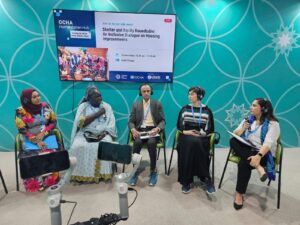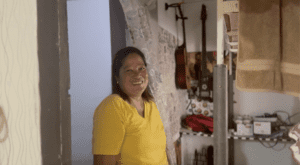
2024 Year in Review
Dear Partners in Resilience,
As we begin 2025, I am filled with gratitude for our shared journey toward a world where every home is disaster-resilient. The urgency of this vision is more clear than ever as we see the increasing impacts of climate change and disasters, and we are deeply grateful for your commitment to addressing this challenge.
In 2024, our 20th Year of Impact, your support enabled us to take important strides towards this vision, empowering communities to build safer and stronger homes. This year also marks a transition for Build Change, as our founder, Elizabeth Hausler, PhD, steps aside as CEO after twenty years of visionary leadership. We are deeply grateful for her unwavering dedication and are pleased that she will continue in an advisory role throughout 2025. I am honored to carry forward her vision with the leadership and support of you, our board, and our global team.
I hope you are as inspired as I am by the many things we’ve achieved together so far and enjoy a sampling of those in this 2024 Year in Review. Thank you for believing and investing in a future where no one is left vulnerable to disaster.
Sincerely,
Juan

Juan Caballero, CEO
Scalable Technical Assistance with BCtap
In 2024, our technology platform BCtap was the cornerstone of impactful collaborations to scale resilient housing. BCtap is equipping multilateral development banks, global NGOs, leading microfinance institutions (MFIs), and multi-stakeholder partnerships like the Coalition for Disaster Resilient Infrastructure (CDRI) to efficiently implement disaster-resilience projects. It does so by providing user-friendly data and tools and a streamlined process to assess houses quickly via mobile devices and then design and build retrofit improvements that incorporate our technical expertise.
Last year alone, BCtap was adapted and integrated into projects that enhanced homeowner and community resilience across Asia, Latin America, and Africa. BCtap was also featured at influential events including the UK Shelter Forum, the World Conference on Earthquake Engineering, and the Asia-Pacific Ministerial Conference on Disaster Risk Reduction.
Customization is underway now in Indonesia — leveraging an investment in September from the Global Innovation Fund (GIF) and continued partnership with KOMIDA, a leading MFI — that will provide access to incremental financing for extreme heat improvements to women making less than $5 per day. We are also integrating AI into the platform to enhance climate resilience in vulnerable communities thanks to product development funding from the Patrick J. McGovern Foundation announced in December.

Learning Lab on BCtap at the Asia-Pacific Ministerial Conference on Disaster Risk Resilience
Systems Change: From Policy to Practice
Lasting climate- and disaster-resilience requires systemic shifts, and in 2024, Build Change focused on embedding resilience into national frameworks and the global housing policy agenda. We engaged in global forums like the Buildings & Climate Global Forum, the World Urban Forum, and COP29, advocating for housing policies that prioritize informality, affordability, and disaster resilience, elements often overlooked in current approaches. Leveraging philanthropic grants, multilateral development bank financing, and multi-stakeholder infrastructure investments, we worked with governments and other implementation partners to put these policy frameworks in practice.
In the Philippines, we worked alongside the national government to champion policy reform that will unlock financing for Preventive House Strengthening (PHS). The half dozen typhoons in November alone highlighted the critical nature of this work, as homes we’d strengthened with our partners weathered the storms and even allowed homeowners to shelter their neighbors.
Our collaboration with Colombia’s Ministry of Housing supported a strategy to integrate community-based organizations in the national home improvement program. This approach was then piloted with funding from Echoing Green in Urabá, where families face both conflict and climate change. Our partnership with the Ministry of Housing also supported the launch of Colombia’s first national regulation for reducing risk in informal masonry housing, AIS410-23.
And, working alongside the Maldives government and the World Bank, we developed Resilient Housing Guidance. This handbook helps Maldivians make their houses stronger and safer, increases resilience to disasters and climate change, and makes homes healthier and more comfortable. Our focus on climate resilience in Small Island Developing States continues as we expand our implementation partnership with the Maldives government and also collaborate with The Ministry of National Education of the Comoros on new projects funded by the Coalition for Disaster Resilient Infrastructure that will increase the resilience of new school buildings.




Corporate Partnerships: Building Resilience from Investment to Impact

Cisco: Investing in product development to scale resilience

Holcim: Recovery and resilience with sustainable materials

Thornton Tomasetti: Strengthening homestays for disaster prevention
Disasters devastate communities, leaving behind shattered homes and disrupted lives. At Build Change, we see firsthand how the private sector can empower communities to not only rebuild but also become stronger and more resilient. Three key 2024 partnerships – with sustainable construction pioneer Holcim, technology leader Cisco, and engineering innovator Thornton Tomasetti – illustrate how companies are implementing their social impact strategies by fueling post-disaster recovery in collaboration with Build Change.
Empowering Communities through Technology with Cisco
Imagine a community reeling in the aftermath of an earthquake. Homes are damaged, infrastructure is crippled, and recovery seems overwhelming. Now imagine a tool empowering that community to take control of rebuilding, providing the information and resources needed for the complex journey from assessment to reconstruction. That tool is BCtap, and its impact has been made possible in part by investments from Cisco. Cisco’s Social Impact Investment strategy focuses on early-stage investment in high-potential nonprofits and their innovative solutions. As a technology company with a long history of innovation, Cisco understands the critical need for patient, catalytic capital to support the ideation, innovation, and experimentation required to create tech-enabled, tech-delivered solutions. Their support for BCtap reflects this strategy, providing funding across multiple stages of development, from initial design to replication and scaling. This has enabled Build Change to deploy BCtap on projects in diverse and challenging contexts around the globe: from earthquake-stricken Türkiye, where BCtap helps assess damage and guide reconstruction, to cyclone-impacted communities in Comoros. The ripple effect of Cisco’s support extends even further, as Build Change leverages additional funding that will enhance BCtap’s capabilities and collaborates with multilateral institutions to use the tool to accelerate recovery.
Building Stronger Foundations with Holcim
Resilience is built on strong foundations. Holcim’s commitment to sustainable building solutions is central to their CSR strategy, and their ongoing partnership with Build Change exemplifies this. In Morocco, Holcim Innovation Center collaborated with Build Change after the 2023 earthquake. In 2024, we pioneered innovative solutions to rebuild and retrofit damaged structures, including using Holcim products to create low-carbon, rollable concrete slabs and exploring debris recycling, reflecting Holcim’s commitment to circularity. This isn’t just rebuilding; it’s also building back better with sustainable materials and techniques. Similarly, in the Philippines, Holcim’s investment empowers families to climate-proof their homes. Through a partnership with Build Change and ASKI-MFI, families access housing loans, learn about resilient construction, and use Holcim’s low-carbon cement.
Investing in Community-Led Resilience with Thornton Tomasetti
True resilience requires empowering communities to own their safety. Thornton Tomasetti’s commitment to designing for a better world is a core tenet of their CSR strategy, and their partnership with Build Change reflects this. Imagine a community nestled in the hills of Nepal, where homes serve as both shelter and a source of income for local families but are also vulnerable to earthquakes. Thornton Tomasetti’s funding has enabled homeowners in the Hilltop Community Homestay to retrofit their houses, making them safer and more attractive to tourists. Moreover, the retrofitting process itself becomes a learning opportunity, building local capacity in resilient construction techniques that will be deployed by builders as they strengthen other homes in the community.
These partnerships – with Cisco, Holcim, and Thornton Tomasetti – demonstrate how corporate funding, strategically deployed as part of a comprehensive CSR strategy, can translate into tangible, lasting impact on the ground. We believe that by working together, we can empower communities to not only survive disasters, but to thrive in their aftermath.
Support resilient housing worldwide
Join us in preventing housing loss caused by disasters.
Donate nowNewsletter
Sign up for our newsletter to receive updates on our latest news, events, and more.

